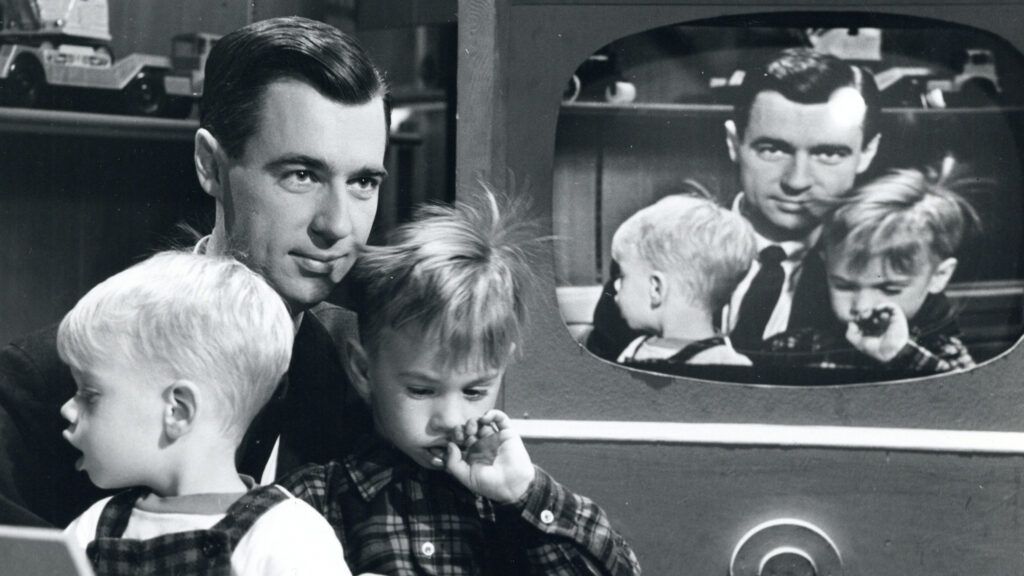Maxwell King’s book The Good Neighbor: The Life and Work of Fred Rogers is the first full length biography of the man behind Mister Rogers’ Neighborhood. It’s a deep, honest dive into the history and values that shaped one of the most beloved figures in television history.
In this excerpt, King explores the backstory of a powerful and game-changing moment that changed the national perception of children with disabilities.
Behind the Scenes in the Neighborhood
In 1975, Jeffrey Erlanger, a five-year-old boy from Madison, Wisconsin, confined to a wheelchair, asked his parents, Howard and Pam, if he could meet Mister Rogers rather than going to Disneyland. It was the family’s own version of “Make-A-Wish,” proposed on the eve of major surgery to fuse Jeff’s spine. When asked in an interview why Jeff chose Fred Rogers, Howard and Pam explained that their son “always said that Mister Rogers told him that he was special and that he was just fine the way he was, and it gave him confidence and it made him feel good, and Mister Rogers just seemed to love him.”
Jeff and his sister, Lisa, both watched the Neighborhood so often that they knew all the words to Fred Rogers’s songs. Pam and Howard Erlanger wrote a letter to the television star about Jeff’s desire to meet him, and they got a handwritten answer that led to a breakfast meeting at a hotel in Milwaukee, where Fred Rogers was visiting to promote the local PBS station. Later they continued to correspond; Mister Rogers wrote to say how glad he was that Jeff’s surgery had gone well.
The years passed, and even if the growing Jeff didn’t watch the Neighborhood quite as often as he had when he was younger, he kept a place in his heart for Mister Rogers. Then in 1980, Fred Rogers decided he wanted to have a child in a wheelchair on the show for a theme week on all things mechanical and electrical:
“He remembered Jeff, and he told his staff to get Jeff. The staff said, ‘There’re handicapped kids in Pittsburgh. We don’t have to fly somebody here from Wisconsin and go through all that. We could just go down the block.’ No. Fred insisted it had to be Jeff,” recalled Pam and Howard Erlanger.
Reasonably enough, the staff at the Neighborhood thought the family lived in Milwaukee, not in Madison. And Fred Rogers remembered them as the Ehrlingers. When they couldn’t be located, Rogers instructed the staff to put the project on hold. But in cleaning out some files, the Neighborhood’s staff found letters from the Erlangers about their older daughter, Lisa, not Jeff. Lisa was worried about the fact that in her mind, the show “didn’t have any strong female role models.”
Rogers had written to say that the Neighborhood was made of modules, and some of the segments dated from the 1960s; he was trying to remedy the situation. In fact, a song from a very early show included these lyrics: “My daddy’s strong and drives a car and my mom’s pretty and cooks.” For all his humanistic impulses, Fred Rogers was also a man of his times.
Once the Erlanger family had been located, they were all flown to Pittsburgh for the taping. Jeff was now a preternaturally intelligent ten-year-old. When asked if there was any special preparation for Jeff, his mother, Pam, said: “Absolutely not. The first time Jeff heard anything about what was going to happen was when we arrived on the set a few minutes before they started rolling the cameras. At that point Fred said to him, ‘Jeff, I’m just going to ask you some questions, and then we’ll sing a song together.’ He did say, ‘Remember, we’re talking to very young children so don’t use any words that are too big.’”
Jeff Erlanger didn’t quite heed Mister Rogers words. In one of the Neighborhood’s most memorable broadcasts in 1981, Mister Rogers asks Jeff straightforwardly about the mechanics of his wheelchair, and how he wound up in it. The young boy explains his medical condition (resulting from a spinal tumor) in sophisticated detail, including even his urinary functions.
Mister Rogers listens intently and says simply: “Your parents must be very proud of you.”
This was the Zen of Fred Rogers’s radical acceptance: There was no topic he wouldn’t address on air, no matter how difficult. “We don’t fudge things,” he said once when asked about the sources of the show’s popularity. “People long to be in touch with honesty.”
Producer Margy Whitmer recalls Jeff Erlanger’s appearance on the Neighborhood: “It was one of the most stunning moments. . . . Here’s this child who has multiple disabilities, and Fred said, ‘Talk to me about that wheelchair. Talk to me about what’s wrong with you.’ And this extraordinary kid talked about it in a matter-of-fact way. Fred . . . presented it to kids watching the show, as ‘this is just the way he is.’”
Jeff’s parents felt completely comfortable allowing their son to speak this way on television because, as Howard Erlanger explained: “In our own way, we felt totally analogous to how the kids felt, that Fred Rogers was part of our family, that he was just a regular person. And we saw that everything that happened on the show was very warm and nurturing and supporting, so whatever it was that Jeff was going to do was going to be nurturing and supporting. There was no risk whatsoever that there could be anything that would be embarrassing or that we would be unhappy.
“We just felt totally comfortable, like we were going to a relative’s for an evening.”
Jeff Erlanger and Fred Rogers didn’t meet again until nearly twenty years later, when Fred Rogers was being inducted into the Television Hall of Fame in 1999. When Jeff rolls onstage to surprise him, Rogers runs up to the stage and hugs him as if they are the only two people in the auditorium. “On behalf of millions of children and grown-ups,” says Jeff to Fred Rogers, “It’s you I like.”
There wasn’t a dry eye in the well-dressed house.
An excerpt from the new book The Good Neighbor: The Life and Work of Fred Rogers by Maxwell King published by Abrams Press © 2018 Maxwell King







